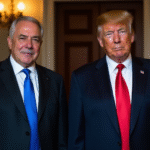Background on Key Figures and Context
The tension between the United States and Colombia escalated on September 29, following the resignations of two cabinet ministers from their US visas and notifications to another two high-ranking officials that their visas had been revoked. This action mirrors the situation with Colombian President Gustavo Petro, who also had his visa withdrawn by the US.
Gustavo Petro, a prominent figure in Colombian politics, is a well-known leftist politician and former Mayor of Bogotá. He was elected as Colombia’s president in May 2022, becoming the country’s first openly socialist head of state. Petro has been vocal about social inequality, human rights, and environmental issues.
Rosa Villavicencio serves as Colombia’s Foreign Minister, while Germán Ávila is the Minister of Finance. Edwin Palma holds the position of Minister of Mines, and Angie Rodríguez is President Petro’s principal advisor. These individuals are crucial members of the Colombian government, playing significant roles in shaping domestic and international policies.
Key Events and Decisions
- Visa Revocation: The US revoked the visas of President Petro and four key members of his cabinet, including Foreign Minister Rosa Villavicencio and Finance Minister Germán Ávila.
- Resignations: In response to the visa revocation, Minister of Mines Edwin Palma and Presidential Advisor Angie Rodríguez resigned from their visas.
- Reactions: Petro expressed pride in renouncing the US visa, stating that it was an honor not to have one from a country supporting alleged “reckless and inflammatory” actions during a protest in New York.
- Minister Benedetti’s Statement: Interior Minister Armando Benedetti suggested that more visa resignations might follow within the cabinet.
US Response and Petro’s Alleged Actions
The US government denied that President Petro called for US soldiers to disobey orders or incite violence among Palestinian protestors following his participation in the UN General Assembly the previous week.
Petro’s decision to renounce his visa stems from his belief that the US is punishing him for his pacifist views and commitment to human rights. He argues that holding a US visa is not necessary for working in the best interests of his people.
Impact on Colombia-US Relations
The visa revocation and subsequent resignations have heightened tensions between Colombia and the United States. The move is seen as a political statement against Petro’s policies and actions, potentially affecting cooperation in areas such as trade, security, and diplomacy.
Colombia’s response emphasizes the importance of working for its people without relying on US visas. This stance may encourage other Latin American nations to follow suit, challenging the US’s influence in the region and promoting greater autonomy.
Key Questions and Answers
- What is the main issue? The primary concern is the US revoking visas of Colombian officials, including President Gustavo Petro, in response to perceived inflammatory actions during a protest.
- Who are the key figures involved? The main individuals are President Gustavo Petro, Foreign Minister Rosa Villavicencio, Finance Minister Germán Ávila, Minister of Mines Edwin Palma, and Presidential Advisor Angie Rodríguez.
- What is the significance of these resignations? These resignations symbolize a defiance against US influence and demonstrate Colombia’s commitment to working for its people without relying on US visas.
- How might this affect Colombia-US relations? The visa revocation and subsequent resignations could strain cooperation between the two nations in various sectors, potentially encouraging other Latin American countries to assert greater autonomy.






